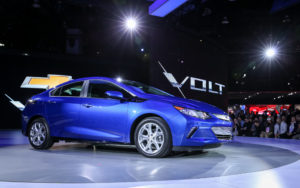General Motors has started manufacturing an electric vehicle called the Chevy Volt. It claims the car will drive up to 40 miles on its lithium-ion battery, which can be recharged at home or work using a regular electrical outlet. According to GM, more than 75 percent of Americans live within 20 miles of where they work. If that sounds like your commute, you could drive the Volt to your job and back on 100% electricity without generating any of the emissions that cause air pollution or climate change, at a cost of about 80 cents in electricity a day.
If the battery does run down, the 1.0-liter, three-cylinder gas engine acts as a generator to charge the battery and provides enough power for up to an additional 600 miles. Says Chevy, the Volt will get 50 mpg with the generator running in what’s called “extended range” mode. If you drive 60 miles, with the last 20 miles in this mode, you’ll enjoy a 150 mpg equivalent for the trip.
Does the car’s high fuel efficiency rating mean it’s “good” for the environment? That begs the question, is ANY car good for the environment?
After all, manufacturing a car is still a polluting, resource-intensive process. Fom an environmental perspective, driving a car is still inferior to using mass transit, biking, walking, and telecommuting, Americans need better transportation options, not necessarily better cars.
However, I think it’s fair to say that the Volt is “better” for the environment, in several ways:
It shows that any company – even one like General Motors, maker of one of the world’s most polluting, least efficient vehicles, the Hummer – can make great strides in creating new products to protect the planet and human health.
It demonstrates to consumers that their demands for more environmentally-responsible products create a powerful incentive to businesses to clean up their act.
It fuels competition. General Motors may be the first to market with its electric car, but it won’t be the last. It has set a standard other manufacturers will now be in a race to emulate. Remember the history of hybrids in the U.S.? In 1998, there were virtually no hybrids being sold. In 1999 Honda introduced its first hybrid model, followed by the Tyotoa Prius hybrid in 2000. The wild popularity of these cars, especially the Prius, inspired a frenzy of re-design among all car companies. These days, every automobile manufacturer has at least one hybrid in its showroom – and over a million hybrids are being sold every year.
Should we all get out of our cars more?
Absolutely.
But when we drive, should we drive cars like the Volt (especially when their price comes down) that generate the least amount of pollution possible? You bet.
For more commentary, take a look at my recent conversation with Neil Cavuto on Fox News.
Don’t have a Volt but still want to get great gas mileage? Look here.

















10 thoughts on “Is the Chevy Volt Good for the Environment?”
I’m hoping there comes a day when all cars are either hybrids or electric. It’s about time GM came out with a car like this. They’ve been slower in comparison to Chrysler and Ford when in manufacturing gas-efficient cars.
I was interested to get your take on the Volt. One of my biggest beefs with the Volt, the Tesla and other vehicles of their ilk? Hardly anyone can buy them – and that’s just when they finally become available for sale. I’ve been reading about the Volt for years and its just not becoming available?!
Excellent post on the Volt auto – I am planning a car purchase so your information is timely. I will go test drive one. I want a eco-friendly auto and the Volt seems to fit the bill. Thanks for the advice.
I think it is great that GM is trying to make up for the misgivings of their past, but I wonder if it is little too late for some. It takes a lot for the public to forgive all those big SUVs they made when we were crying for something else.
Nonetheless, it seems like they are doing a good thing with the Volt. Great post.
Jeanne
http://www.ecolabelfundraising.com
Unfortunately there is a lot of GM info about this vehicle’s green credentials that is just marketing hype. The GM marketing assumption that electricity is free from pollution is appealing but totally erroneous. The electric phase (even if it actually achieves the 40 mile range under real driving conditions) only partially offsets the petrol CO2 and should it achieve less than this range there is even a pivot point where it will actually cause more CO2 pollution than driving 40 miles on petrol.
However, your point that this is a greener car than Hummers and gas guzzlers is true. At this moment in time, until we get truly pollution free electricity generation at source, all electric vehicles still have a CO2 footprint and we should be focussing on achieving true overall increases in equivalent mpg rated not only by petrol consumption but by CO2 production per mile.
We also need to realise that at this time energy is also a significant issue, not just CO2. We do not currently have a suitable power source to replace petrol as a significant alternative for personal transport with the same amount of current freedom. Petrol is a limited and unique resource and we should be treating it as such. America’s profligate use of petrol in their personal transports obsession with size and power borders on a combination of obscene and stupid, although there seems to be a groundswell of understanding about this and the American future looks greener. The “car-ification” of China and India will result in significant issues in the near future as petrol becomes a much more limited resource.
There are lots of proper analyses on the web for the absurd claims GM are making for this vehicle. Feel free to read (and to criticise!) my blog for a better and fuller evaluation of the real figures for Chevy Volt than GMs marketing department’s “engineers”: http://aphanez.blogspot.com/
Thanks for the book recommendation! I’ll definitely check it out.
I just love your blog! I get some great tips from you, and that’s why I wanted to share one of my great finds with you. As a mom who works hard to create green living and a healthy environment for my family, I have found the book Healthy Baby Happy Home to be insightful. You can learn all about it at http://www.healthybabyhappyhome.com/ .
There is some amazing insight on green living, and how certain products in our very own household may be the cause of the problem. I want to tell everyone I know about it, and it seemed like something that you may be interested in after reading your blog.
I hope you learn as much as I did after reading it, and that it helps to reinforce your commitment to green and healthy living.
Thanks, Caitlin. I’m sort of dreaming of a more bikes-more mass transit-more walkable communities country!
Good day! Would you mind if I share your blog with
my facebook group? There’s a lot of folks
that I think would really appreciate your content.
Please let me know. Thank you
Sure. Thanks.
Comments are closed.